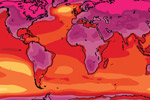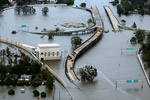Bring on the cool weather – climate change is predicted to cause extreme weather, more intense storms, more frequent floods and droughts, but could it also cause us to be more violent with one another?
A new study from scientists in the US controversially draws a link between increased rates of domestic violence, assault and other violent crimes and a warming climate.
That conflict could be a major result of global warming has long been accepted. As climate change makes vulnerable parts of the world more susceptible to weather-related problems, people move from an afflicted region to neighboring areas, bringing them into conflict with the existing populations. That pattern has been evident around the world, and experts have even posited that conflicts such as Darfur should be regarded as climate related.
But the authors of the study, published in the peer review journal Science, have departed from such examples to look closely at patterns of violence in Brazil, China, Germany and the US.
The authors suggest that even a small increase in average temperatures or unusual weather can spark violent behaviour. They found an increase in reports of domestic violence in India and Australia at times of drought; land invasions in Brazil linked to poor weather; and more controversially, a rise in the number of assaults and murders in the US and Tanzania.
The authors searched historic records as well as examining contemporary statistics. Solomon Hsiang, of University of California Berkeley in the US, who was lead author of the study, said: “What was lacking was a clear picture of what this body of research as a whole was telling us. We collected 60 existing studies containing 45 different data sets and we re-analyzed their data and findings using a common statistical framework. The results were striking.”
The study found that conflict, including domestic violence and ethnic violence, was heightened as temperatures rose. The authors said that in all of the 27 studies of modern societies they looked at, higher temperatures showed a correlation with rising rates of violence.
But they could not say why this might be the case. More studies would be needed to confirm the results and explain why such a correlation might exist, they said. The underlying reasons could run from increased economic hardship as harvests fail or droughts bite, to the physiological effects of hot weather.
“The studies showing that high temperature increases violence crime in the US and other wealthy societies seems to suggest that physiological responses are important, too, with very short-run exposure to heat contributing to more aggressive and violent behaviour,” said Marshall Burke, also of Berkeley.

Global temperatures from 2000-2009 as compared to average temperatures from 1951 to 1980. The last decade was the warmest on record so far. Image by: NASA.
Original Post: Climate change linked to violent behaviour
Related articles
Climate could warm more rapidly than any time in the last 65 million years

(08/01/2013) According to a new review of 27 climate models, scientists say the global climate is likely to experience a warmth as great as any in the last 65 million years, only much, much faster. According to the study published today in Science, the Earth’s land temperature will rise by 4 degrees Celsius (7.2 degrees Fahrenheit) from pre-industrial levels by 2100 if we continue on our current emissions trajectory.
Drastic cuts to greenhouse gases could save hundreds of U.S. cities from watery grave

(08/01/2013) More than 1,700 American cities and towns – including Boston, New York, and Miami – are at greater risk from rising sea levels than previously feared, a new study has found. By 2100, the future of at least part of these 1,700 locations will be “locked in” by greenhouse gas emissions built up in the atmosphere, the analysis published in the Proceedings of the National Academy of Sciences on Monday found.
(07/30/2013) Rapid thawing of the Arctic could trigger a catastrophic “economic timebomb” which would cost trillions of dollars and undermine the global financial system, say a group of economists and polar scientists. Governments and industry have expected the widespread warming of the Arctic region in the past 20 years to be an economic boon, allowing the exploitation of new gas and oilfields and enabling shipping to travel faster between Europe and Asia.
Yukon Flats experiencing more wildfires now than in the last 10,000 years
(07/22/2013) The Yukon Flats area of Alaska is today burning more frequently and severely than it has in the last 10,000 years, according to new research published in the Proceedings of the National Academy of Sciences (PNAS). Looking at charcoal fragments from 14 deep lakes in the region, scientists were able to reconstruct the fire history of this particular forest, which covers around 2,000 square kilometers. Scientists have long warned that as the temperature worldwide continue to rise from climate change, wildfires are likely to become more common.
Featured video: mangroves in El Salvador imperiled by climate change
(07/17/2013) A new short video by Friends of the Earth International highlights the impacts of climate change on mangroves in El Salvador, which local fishermen depend on for their livelihoods.
Forests may be using less water as CO2 rises
(07/11/2013) Forests may be becoming more efficient in their use of water as atmospheric carbon dioxide levels rise, reports a new study in Nature.
Rising temperatures are triggering rainforest trees to produce more flowers
(07/09/2013) Slight rises in temperatures are triggering rainforest trees to produce more flowers, reports a new study published in the journal Nature Climate Change.
Hurricane intensity, frequency to increase with climate change
(07/08/2013) Warmer ocean temperatures will increase the frequency and intensity of tropical cyclones, typhoons and hurricanes in “most locations” this century, concludes a new study based on simulations using six global climate models.
In age of climate change, Australia’s vast coal fields could become worthless
(07/02/2013) Australia’s huge coal industry is a speculative bubble ripe for financial implosion if the world’s governments fulfill their agreement to act on climate change, according to a new report. The warning that much of the nation’s coal reserves will become worthless as the world hits carbon emission limits comes after banking giant Citi also warned Australian investors that fossil fuel companies could do little to avoid the future loss of value.
Campaign contributions suggest dead-end for Congressional action on climate
(06/26/2013) Sources of campaign contributions to members of Senate suggest Congress will be unlikely to take action on comprehensive climate legislation, indicates data collected by MapLight, a group that tracks money’s influence on politics.
After long wait, Obama lays out fight against climate change

(06/25/2013) Five years after being elected president and six months after winning a second term, President Obama today gave his first speech devoted solely to climate change and announced several executive actions to begin weaning the United States (historically the largest emitter of greenhouse gases) off fossil fuels. At Georgetown University today, Obama stated that his administration would expand renewable energy projects on federal lands, raise energy efficiency standards on appliances, and, most importantly, limit carbon pollution from both existing and new power plants, which represent about 40 percent of the U.S.’s emissions. Obama also noted that the U.S. would spearhead global efforts to combat climate change which is pushing sea levels higher, melting glaciers and sea ice, exacerbating fires, imperiling species, and worsening extreme weather worldwide.







